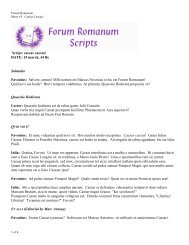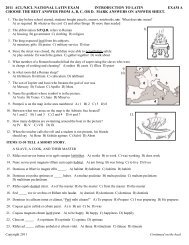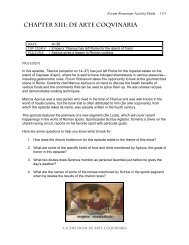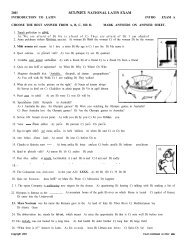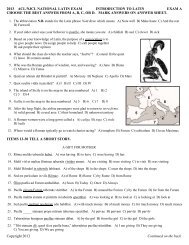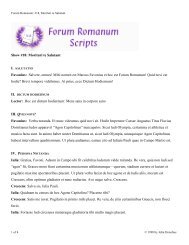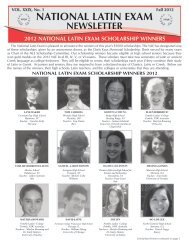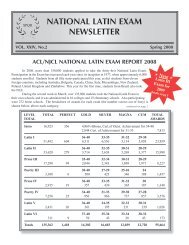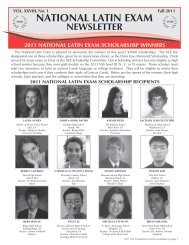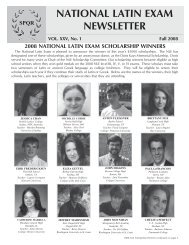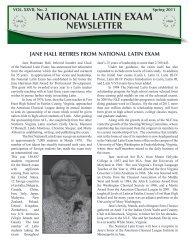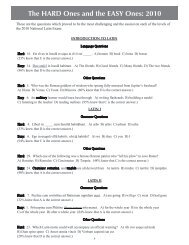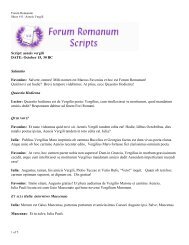2009 acl/njcl national latin exam introduction to latin intro exam a ...
2009 acl/njcl national latin exam introduction to latin intro exam a ...
2009 acl/njcl national latin exam introduction to latin intro exam a ...
Create successful ePaper yourself
Turn your PDF publications into a flip-book with our unique Google optimized e-Paper software.
<strong>2009</strong> NATIONAL LATIN EXAM TRANSLATION KEY<br />
Introduction <strong>to</strong> Latin<br />
Every day a woman walks on the road through the forest. She walks through the fields <strong>to</strong> the house of the farmer. The woman gives two coins <strong>to</strong> the farmer, and the<br />
farmer gives ten apples <strong>to</strong> the woman. When the woman returns <strong>to</strong> her house, she sings. Every day the horse hears the woman and walks <strong>to</strong> the woman. The woman<br />
always gives one apple <strong>to</strong> the horse.<br />
One day a robber sees the woman and the ten apples. The robber hits the woman and drags (her) in<strong>to</strong> the forest. The woman is unconscious, and the robber takes ten<br />
apples. Then the woman regains consciousness. She is alone. She shouts but no one replies. The forest is dark. Because the woman is trying <strong>to</strong> be calm, she sings.<br />
The horse hears the woman and hurries <strong>to</strong> the woman. The horse carries the woman out of the forest. Now every day the woman gives two apples <strong>to</strong> the horse.<br />
Latin I<br />
Once there was a king named Picus. Near the palace of Picus the famous witch Circe used <strong>to</strong> live. Circe had a great and evil power; often she used <strong>to</strong> change men<br />
either in<strong>to</strong> beasts or in<strong>to</strong> birds. Circe saw Picus and immediately fell in love. The king, however, did not love the witch because he already had a beautiful wife. Circe<br />
was angry, and she wanted <strong>to</strong> punish Picus.<br />
"Tomorrow Picus will not wear the crown of a king," she said, "but the crest of a bird."<br />
On the following day, the king invited the people <strong>to</strong> a great dinner. Before dinner Picus walked in<strong>to</strong> the nearby forest with a few friends. Circe also walked secretly<br />
in<strong>to</strong> the forest and sat in a tall tree. Soon the king's friends saw a strange sight for Circe changed Picus' form. The king no longer was wearing a crown; he had a crest.<br />
Now Picus' hands were wings; Picus had the feet of a bird. He did not have a nose but a beak. He was wearing feathers of many colors. (His) voice was no longer<br />
(that) of a man but of a bird. And when it was time for dinner, Picus did not walk but flew in<strong>to</strong> the dining room. Afterwards he lived in the woods and gardens; he<br />
never again had a human form.<br />
Latin II<br />
Once there was a Roman legate named Gaius Verres who was wicked and crazy. This man, while making a journey from Italy, came <strong>to</strong> the island Delos. On this<br />
island there was a very famous temple of Apollo. Verres visited the temple and saw many and beautiful things which he desired. Therefore this man removed the very<br />
beautiful statues from this temple one night and he placed them on a ship.<br />
On the next day, after the theft had been discovered, the inhabitants of this island were angry, but also they were very greatly afraid of life on the island without the<br />
statues. “Apollo will be angry,” they said. “How will we live our lives?”<br />
The ship, however, which was carrying the statues had scarcely departed when a great s<strong>to</strong>rm arose. The ship was destroyed, but Verres survived. The statues which<br />
had been found on the shore were put back in<strong>to</strong> the temple by the inhabitants. Soon this wicked man returned <strong>to</strong> the city Rome. Later Gaius Verres was made<br />
governor of Sicily. There he again <strong>to</strong>ok the arts of an island.<br />
Latin III<br />
Part 1: A slave, named Antius, was fleeing from the fields because ash and s<strong>to</strong>nes were falling from the sky. The slave, who had often desired freedom and riches,<br />
was hoping that his master would not find him in such great confusion. While he was running through the fields, Antius caught sight of a wagon in which several<br />
frightened people were being carried. “Hey,” shouted the driver, “Climb up! Save yourself! Vesuvius is no longer sleeping.” Without delay Antius climbed in<strong>to</strong> the<br />
wagon.<br />
Part 2: In a short time the driver caught sight of an old man carrying with difficulty a heavy chest. “It is permitted for you,” shouted the driver, “<strong>to</strong> climb in<strong>to</strong> the<br />
wagon but the chest must be left behind by you!” The old man immediately threw down the chest and climbed in<strong>to</strong> the wagon. Antius saw that the chest broke open and<br />
poured out very many gold and silver coins on<strong>to</strong> the road. Although ash and s<strong>to</strong>nes were beginning <strong>to</strong> fall more heavily, Antius nevertheless immediately jumped down<br />
from the wagon and began <strong>to</strong> pick up the coins. The driver ordered Antius <strong>to</strong> come back in<strong>to</strong> the wagon but the slave, forgetful of the danger, did not obey him. Antius<br />
therefore was left behind. A few days later, after the eruption had ended, Antius, similar <strong>to</strong> one sleeping, still holding the coins in (his) hands, was found by his master.<br />
Latin III-IV Prose<br />
An<strong>to</strong>nia, the mother of Claudius, used <strong>to</strong> say that her son was a monster of a man, not completed by nature but only begun. If An<strong>to</strong>nia were accusing anyone of<br />
stupidity, she used <strong>to</strong> say that he was more stupid than Claudius. Nor in truth was he free from constant abuses from others. For if he had arrived a little <strong>to</strong>o late at the<br />
appointed time of dinner, it was ordered <strong>to</strong> Claudius that he limp around the dining room before he might be received. And whenever he used <strong>to</strong> sleep after (his) food,<br />
which was usually happening <strong>to</strong> him, he was being attacked with the pits of olives; sometimes he was being awakened by jesters with a whip as if by sport. And<br />
slippers used <strong>to</strong> be put on the hands of (him) sleeping so that Claudius, awakened suddenly, might rub his face with these. Although the greatest part of his life had<br />
been spent in the midst of such things, nevertheless, he <strong>to</strong>ok the power in his fiftieth year.<br />
Latin III-IV Poetry<br />
And Eurydice, having been returned, was coming <strong>to</strong> the upper breezes, following behind, for Proserpina had given this agreement, when sudden madness seized the<br />
incautious lover, (madness which) indeed must be forgiven if the spirits of the dead know how <strong>to</strong> forgive. He s<strong>to</strong>pped and already near <strong>to</strong> daylight itself, unmindful,<br />
(alas!) and overcome in spirit, he looked back at his Eurydice. There all his labor was wasted, and the promises of the harsh tyrant (were) broken, and three times a<br />
crash (was) heard from the pools of Avernus. She said, “Who has destroyed both you and wretched me, Orpheus, what madness so great? Behold, again the cruel Fates<br />
call (me) back and sleep covers my swimming eyes. And now farewell.”<br />
Latin V-VI<br />
The horse of Alexander was Bucephalas. Chares wrote that he had been bought for thirteen talents and given <strong>to</strong> king Philip; however, in respect <strong>to</strong> this sale the sum<br />
of our money is three hundred and twelve sesterces. Concerning this horse it seemed worthy of memory that when he had been armed and equipped for battle, he would<br />
never allow himself <strong>to</strong> be mounted by any other than by the king… When sitting on him (Bucephalas) in the Indian war and doing valorous deeds, Alexander, not<br />
looking out for himself enough, had driven him (Bucephalas) in<strong>to</strong> the military formation of the enemy, and the horse had been pierced with deep wounds in his neck<br />
and side after weapons had been hurled at Alexander from all sides, but though dying and almost exhausted from loss of blood, he yet in swiftest course carried back the<br />
king from the midst of the enemy. And when he (Bucephalas) had carried him out of range of the weapons, right then and there he fell, and confident now in the<br />
survival of his master, as though with the comfort of human feeling, he breathed his last breath. Then King Alexander, after vic<strong>to</strong>ry of this war was brought forth,<br />
founded a <strong>to</strong>wn in the same places and because of the honors of his horse, he named it 'Bucephalon.'<br />
Nor (was there) delay, when--marvelous <strong>to</strong> tell--the pregnant earth brought forth a race generated from the poisonous seed, and at the same time, (she) endowed<br />
(them) with shining weapons. These (the race of warriors), after they saw the son of Aeson alone in (at the edge of) the wide field, suddenly turned (themselves) against<br />
the youth in close combat, with spears drawn, (and) turned their furious animosity (against the youth).<br />
A huge fear struck (his) comrades. And she herself (Medea), aware of the (dangerous) deed, as she recognized that so many armed enemies were rushing--like a<br />
hails<strong>to</strong>rm--at him alone, frantic, grew pale, and calls forth the magical arts, which she had cast beforehand, and again recites (her) spells and enchantments.<br />
He, however, fearless, cast at the coming array a hard rock which the maiden, not at all unaware of the future danger, had given (him) as a sacred and calming<br />
protection. They turned (their) deadly weapons of war and (their) matching battle lines among themselves, and exterminated themselves in gory battle.<br />
© Copyright <strong>2009</strong>



